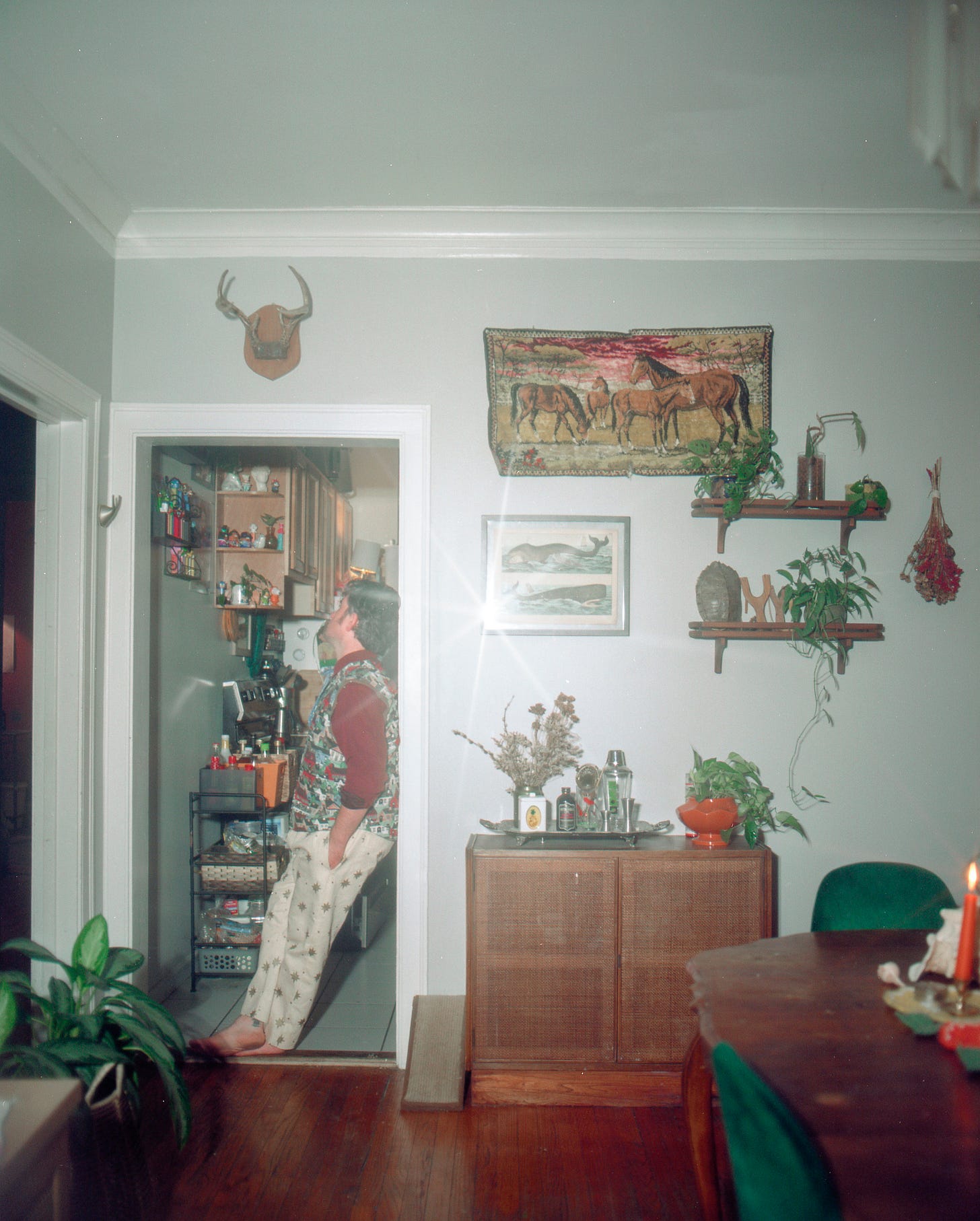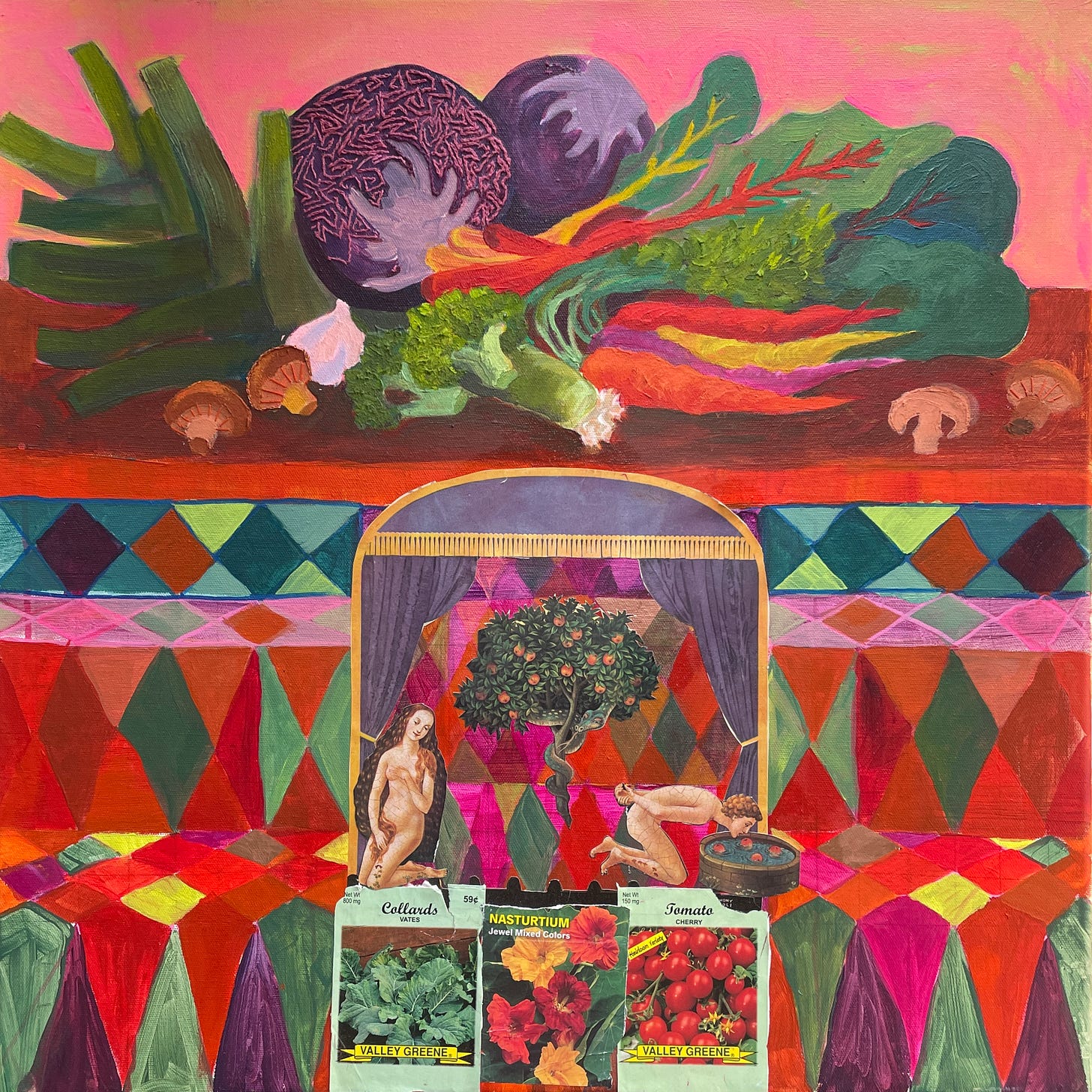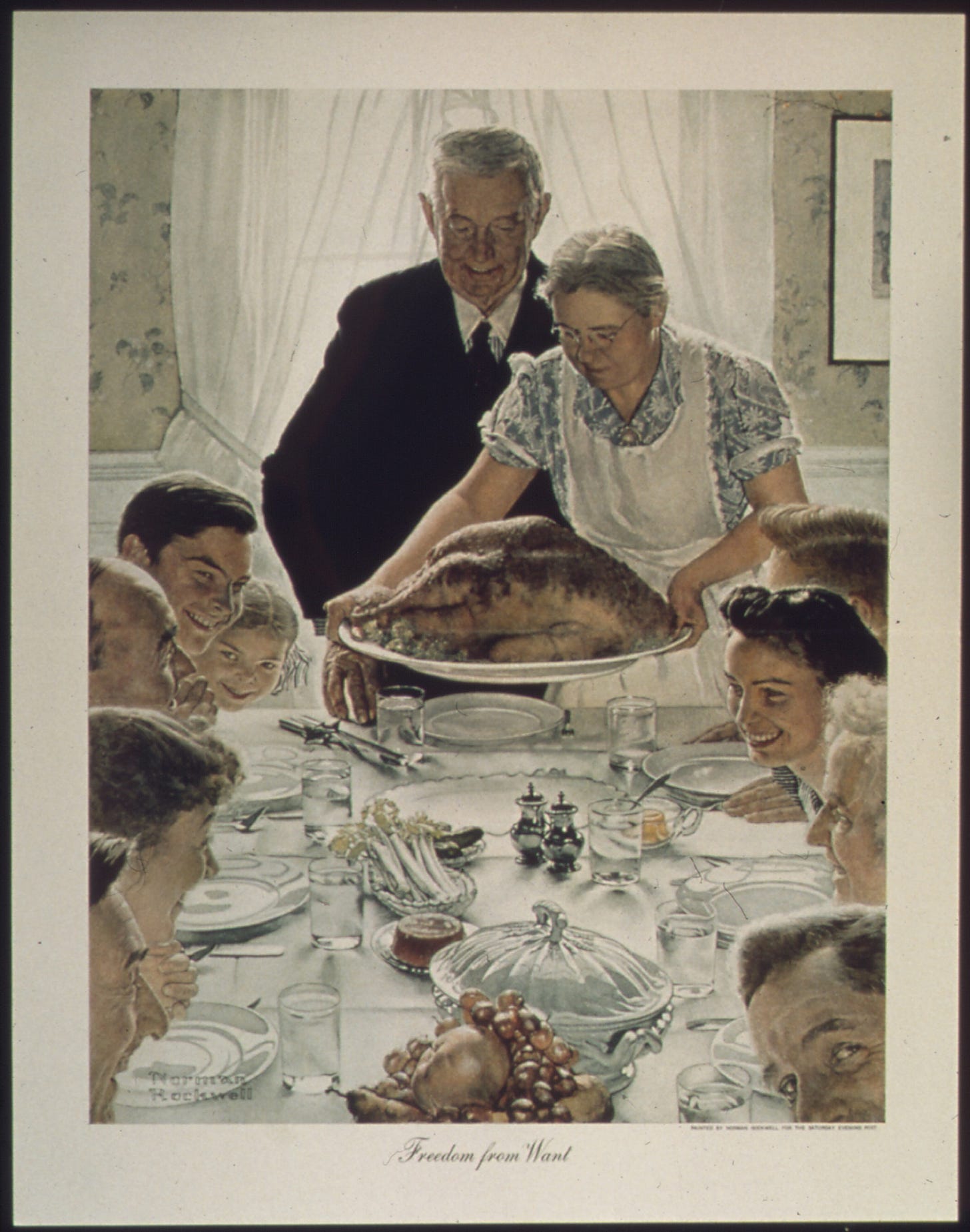Freedom from Want
Thought's on Rockwells painting, Roosevelt's speech and Bulosan's speech "Freedom from Want"
Dear Reader,
I hope wherever this finds you, you are free from want.
Thanksgiving has become my favorite holiday as I’ve grown older and acquired a table of my own. I love the rituals of cleaning the house, preparing an elaborate meal, and setting a table for our friends. I spend the whole day with my partner, nursing a massive pot of collard greens, and passing a fork between us until we arrive at the perfect proportions of salt and acidity. I can’t imagine a more perfect way to spend a day.
This time of year is also a descent into madness. For many, this is the time of year for the national pilgrimage to one’s origins. While this tradition has slight variations in different regions of the United States, I can assume it goes something like this for you:
This is the beginning of a 2-month negotiation of who gets a visit for Thanksgiving, who for Christmas, and whose visit will have to be moved to next year. This is the time of year we all rush to an airport, to fly to another airport that is eerily similar to the one you departed from. Even outside, the built environment is much the same; the cars are the same, and aside from a new landscape, the architecture and chain restaurants sprinkled along the highway are also the same.
Upon arrival at a relative’s house, we notice the interiors of their houses also seem to merge with other waiting rooms and offices we have been in. You can’t seem to touch anything solid, either—the dining room table itself was chosen from the same online catalog where you selected your furniture. Everything heard around the table feels like a phrase you first encountered as a soundbite, which even then was just an echo of someone else. Everything you taste leaves you parched for acidity in all of the richness of the turkey, the dressing, and the casseroles—canned Ocean Spray™ cranberry sauce is the only thing that will save you.
The conversation feels stilted, circling the only five questions they’re comfortable asking, and it is for some reason considered inappropriate to discuss the dubious origins of the holiday being celebrated. You find yourself in a state of hyper-vigilance, reaching for the mashed potatoes.
There are 26 letters in the alphabet, capable of infinite combinations, which have been used to convey an infinite range of emotions and ideas throughout all of time and history. Yet, the people at this dinner table resort to the most simplistic and illogical platitudes and generalizations. These are the kinds of people who say they value things like “family” or “freedom” but whose lives don’t show any evidence of either healthy relationships with anyone close to them, nor any exercise of any true agency.
Now it is time to go around the table and share what we’re thankful for. We will express gratitude for the food before us, which arrived vacuum-sealed and pre-packaged by Butterball®. We will say we are grateful for our homes, though most of us have no idea who built them. We will voice our appreciation for these things, despite being disconnected from the complex web of labor that makes them available at the click of a button or the swipe of a card.
I am thankful for art. Today, I am particularly thankful for Normal Rockwell’s 1942 painting “Freedom from Want.” I would usually dismiss this painting, and much of Rockwell’s other work, as idyllic and nostalgic. I do not connect with this painting on a personal level, but when I view it within its historical context, it becomes a touchstone for cultural values of togetherness, generosity, and freedom. Although I find this image entirely unrelatable, I do find it an interesting contrast to how I view my family’s Thanksgiving table.
Reader, now would be an excellent time to review the painting again to consider what your family’s material reality was like at the time of its making. How much does it differ from the scene in Rockwell’s painting?
Rockwell painted “Freedom from Want” after hearing Roosevelt’s 1941 State of the Union through the radio. I do not know if my grandma Geraldine was lucky enough to own a radio at this time, but let’s assume that she did. She would have heard this same speech while in abject poverty, laundering diapers in a shack in Jacksonville, Florida. Or, she might have purchased copies of The Post illustrated with Rockwell’s paintings. I doubt she had the spare time at all to fully hear Roosevelt’s words and consider how they applied to her life.
At this time, Geraldine was caring for at least 3 or 4 children with a husband who was an alcoholic who spent most of his waking hours in a mad rage, likely burdened by visions of carnage from his time in the Navy. By the time Rockwell’s paintings were published in The Post in 1943, she would have given birth to yet another child, and it is doubtful that she had the spare 25 cents to purchase a copy. If she did, I have to wonder what she would have done with the reproduction of Rockwell’s painting. Would she have hung it on her rotting wall, or would she have tucked it away somewhere in shame?
It feels important for me to acknowledge that while this image was circulating, my family was fighting back against vermin inside their home. My grandma eventually raised 7 children in substandard housing with dirt floors. To my knowledge, no photos of this house survive, but the memories of my father as a child with visible ribs, and eating lead paint off the walls do.
Imagine how Roosevelt's words might have fallen on her ears:
In the future days, which we seek to make secure, we look forward to a world founded upon four essential human freedoms.
The first is freedom of speech and expression–everywhere in the world.
The second is freedom of every person to worship God in his own way–everywhere in the world.
The third is freedom from want–which, translated into world terms, means economic understandings which will secure to every nation a healthy peacetime life for its inhabitants-everywhere in the world.
The fourth is freedom from fear–which, translated into world terms, means a world-wide reduction of armaments to such a point and in such a thorough fashion that no nation will be in a position to commit an act of physical aggression against any neighbor–anywhere in the world.
I visited my dad and my grandma for Thanksgiving last year, at their house in Jacksonville, Florida. Stepping inside of this house is a step inside of a time capsule for the Great Depression. The walls are lined with food storage for the end times, and in the kitchen, there are shelves of reused Welch juice containers full of tap water my grandma has saved for several decades. Despite everyone’s concern for bacterial growth, and chemical leaching, her memories of the Great Depression still cause mistrust that the tap will continue to provide fresh water every day.
To avoid the usual unseasoned, canned, and frozen meal, I volunteered to prepare our Thanksgiving meal on a stove made in the 1930s. I brine a chicken in buttermilk, and while I pat it dry for roasting, it occurs to my dad that he forgot to make sure that rats have not made a nest in the only usable oven upstairs. Luckily, they did not. Although the chicken roasted beautifully, I’m sure you can imagine my hesitation to eat it.
At this house, my family shares a Thanksgiving meal in a room one might call a Dining room, though judging by the assortment of objects in the room, the room doesn’t appear to have any one particular function. The actual dining table holds plastic bins full of old reciepts, invoices, and ephemera. We sit among boxes piled high around us, some full of my grandma’s years of genealogy research, others full of maps and brochures she’s collected. She takes her meal in a chair she found discarded several years ago—a chair that used to be used at a hair salon’s shampoo bowl. My dad and I sit in folding chairs with a folding table to eat on. In this room, they talk about vague ideas of “freedom” and “family values” and I am always asking “Freedom from what?”
Let’s turn our attention back to Rockwell’s painting. The image of the family at this table does not reflect my own reality. It might be similar to yours, our experiences might vary between several levels of extremes. For a moment, let’s suspend our judgment about this painting and the myth of Thanksgiving it perpetuates. For a moment, we assume that Normal Rockwell painted this image with extreme sincerity and that Roosevelt’s Four Freedoms once felt like an attainable dream to the American public.
My family has never found freedom from want. They never had the time to sit together around a radio and consider Roosevelt’s words. It is doubtful that they had a radio, or even a room to find comfort in while they listened. When I visit them, they speak of the concept of freedom in the most vague sense, and they tell me they find hope for the continuance of their “freedom” in a man who openly speaks of limiting freedom.
Along with Rockwell’s painting, an essay of the same title was posted to accompany it by the Filipino American Carlos Bulosan. Here is an excerpt I found interesting:
But we are not really free unless we use what we produce. So long as the fruit of our labor is denied us, so long will want manifest itself in a world of slaves. It is only when we have plenty to eat — plenty of everything — that we begin to understand what freedom means. To us, freedom is not an intangible thing. When we have enough to eat, then we are healthy enough to enjoy what we eat. Then we have the time and ability to read and think and discuss things. Then we are not merely living but also becoming a creative part of life. It is only then that we become a growing part of democracy.
In 2024, most Americans do not struggle for freedom from want, but freedom from our wants. The rooms that house our dining room tables are filled with objects manufactured en mass, made and delivered by people we do not know nor consider. We crowd around a Butterball® turkey delivered to our grocery stores which were slaughtered, plucked, and eviscerated en mass, and consider this convenience as a part of god’s natural order.
I’m preparing to host a Friendsgiving at my house on Sunday. This is a tradition I’ve grown to love, and my dining room does more closely resembles the dining room in Rockwell’s painting with each passing year. I will be considering the words from Carlos Bulosan again:
When we have enough to eat, then we are healthy enough to enjoy what we eat. Then we have the time and ability to read and think and discuss things. Then we are not merely living but also becoming a creative part of life. It is only then that we become a growing part of democracy.
I realize now, that I must be the first in my family to truly know freedom from want. I realize that I’ve had enough to eat, so much to eat that I have even learned how to enjoy it. I also have the privilege of having the time and ability to read and discuss what it means to be a person—a truly free person. I have, for once in my life, absolute freedom from want, so now that I can focus on my freedom from want-ing. And most importantly, I think, the freedom to be creative.






…insane to think about that roosevelt speech in relation to any words by any politician of the modern era…have we lost decorum?…art?…care?…talent?…the list decays…watched planes trains and automobiles as i am want to do this season and the remarkable beauty of john candy still holds…john hughes the 1980’s video rockwell…even there the cracks of americana beauty begin the sprout…life is painful travel for the holidays…ignorance of lonely neighbors…fwiw i got three friendsgiving invites and all my family would have me if i went there…i’m lucky…but it feels increasingly like blizzard…cold and windy…on the back of a truck…wondering if we will ever get to some serene setting…
I love the context you’ve given to Rockwell’s painting, thank you. The way you describe your own home and the homes of others is becoming a beautiful thread through your writing that I’m enjoying immensely.